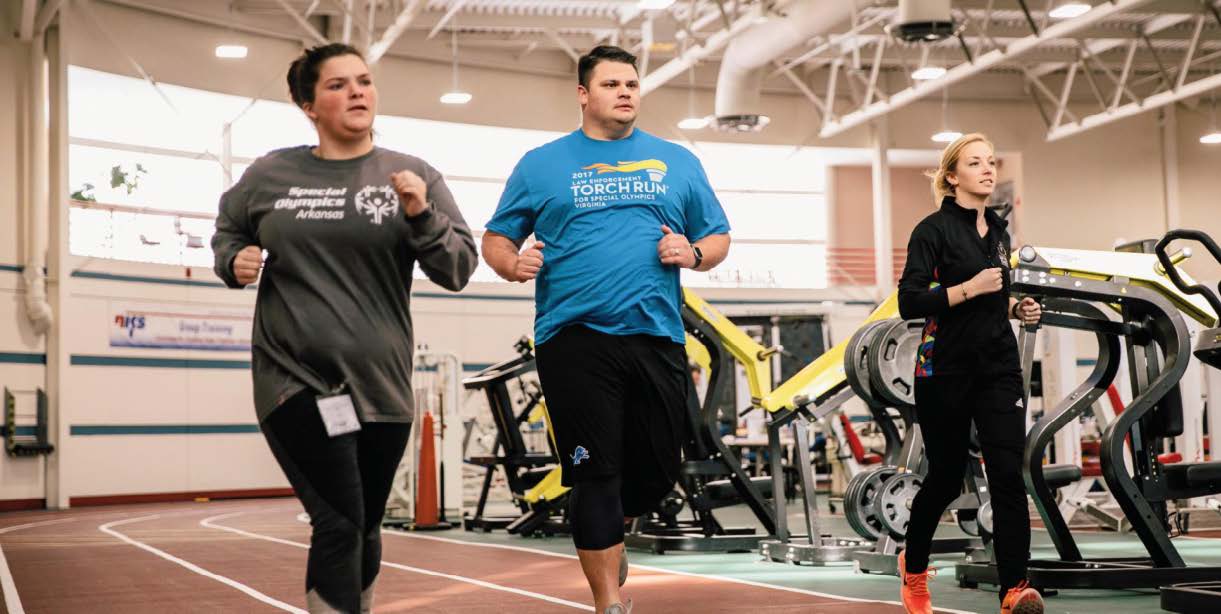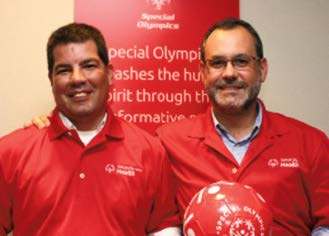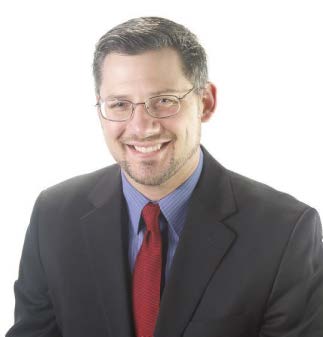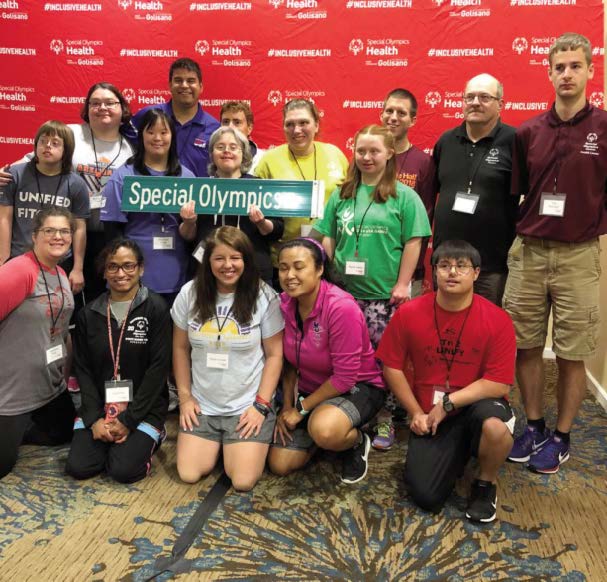
BY KRISTIN HUGHES SROUR
"We are all peaceful protestors against the stigma and indifference which has plagued every person who has a disability. We can no longer measure the value of a person with a disability by their productivity. We share a collective humanity. It is what drives us to move forward. Everyone deserves the same right to health. Don't wait for someone else to make it happen." Parker Thornton, Special Olympics athlete and Health Messenger from New Hampshire, declared this in a speech at the Igniting Change: Inclusive Health Summit in Seattle, Washington in July 2018.
The event brought more than 300 attendees together to learn about the power of inclusion and inclusive health. Parker's voice echoed through the room that day as he told CEOs, health care providers, and thought leaders what they need to do to be more inclusive and how those changes can have a huge impact on his life.
Twenty years of Special Olympics Health programming have exposed the health disparities people with intellectual disabilities (ID) often face. There is a misconception that the poor health of people with ID is due to their disability. However, research has shown that these health disparities are in fact a result of a breakdown in health education, health promotion, and health care, resulting in people with ID being excluded from mainstream health systems. This stigma and discrimination exist throughout the entire health care system. Health care providers lack the training necessary to work with people with ID and even when they are trained, they often do not receive proper reimbursement to treat people with ID. Prevention programming and resources are either not reaching people with ID and their families or caregivers, or they have not been adapted in a way to effectively convey the right health messages. The list of challenges is long, and much work needs to be done.
The only way to find a solution is to have the solution driven by the people who face these challenges daily. People with ID, like Parker, must guide us toward solutions. The Special Olympics Health Messenger program was born out of this notion. In order to create more effective public health programs, improve health systems and engage communities to support the health of people with ID, people with ID must have leadership roles. The Special Olympics Health Messenger program empowers athletes to serve as leaders through a training program that helps them develop healthy lifestyles, build skills and confidence to influence other people to lead healthier lives, advocate within their communities for inclusion around health and wellness services, education and resources, and advocate for the health needs of people with ID. The training program has three core tenets – empowerment, community impact, and leadership and advocacy.
Empowerment: Health Messengers are trained and confident in their ability to act as peer leaders and role models within their Special Olympics communities for fitness and preventative health programs.



A POWERFUL MESSAGE: (Opposite page) Stephanie (left) runs on a track during a workout. (Above, clockwise) Branko (left) testified for more rights for people with intellectual disabilities in Peru; Traveling from 12 states, the newest class of Special Olympics Health Messengers were trained in Washington, DC in September 2018; Parker Thornton uses his voice to fight for inclusive health for people with intellectual disabilities.
Community Impact: Health Messengers lead activation within their broader communities and with their peers to raise awareness and influence other community members to be more inclusive of people with ID.
Leadership and Advocacy: Health Messengers catalyze and support external organizations to work toward making their services, programming, or policies more inclusive.
A Health Messenger is a Special Olympics athlete who has been trained to serve as a health and wellness leader, educator, advocate and role model within their Special Olympics communities and the community at large.
After going through the formal Health Messenger training program, Health Messengers complete a Practicum to implement what they have learned. There are more than 100 that have been trained from 16 countries, and we are just beginning!
Health Messengers are leading fitness classes in their communities, developing health promotion and prevention education for people with ID, talking to health care providers, advocating with local politicians and community leaders, speaking at events, bringing healthy lifestyles to their places of employment and schools, developing social media campaigns and teaching cooking classes, to name a few. Stephanie Price, a Health Messenger from Arkansas, encountered doctors who either refused to see her, or talked down to her at appointments. She finally found a doctor who treated her as an adult and listened to her health concerns. Now she advocates at events and with health care providers about how to talk to and treat a person with ID. She is a fierce advocate with a strong voice and recognizes that not everyone with ID has her voice and it is her responsibility as a Health Messenger to use it. Stephanie is also very passionate about fitness and fellow Special Olympics athletes look up to her for her fitness advice. She created fitness videos every day for five months and posted them on social media to encourage her fellow Special Olympics Arkansas athletes who were competing in the Special Olympics USA Games to get active so they could compete at their highest level. Stephanie, who was once shy, is now outspoken about the health injustice in her community.
Branko, a Health Messenger from Peru, also used his voice to make changes in his country. Earlier this year, Branko testified at a hearing held by the Inter-American Commission on Human Rights. Branko shared with the Commission his experience in the Peruvian legal system regarding obstacles to make decisions on health, employment, education and getting married. A few months later, the Peruvian Government published a decree that recognizes and regulates the legal capacity of persons with disabilities. This decree recognizes the full legal capacity of all persons with disabilities, abolishes guardianship for persons with disabilities, and removes restrictions on their legal capacity (e.g. to marry or to make a will). Thanks to Branko's efforts, he and his fellow athletes in Peru will have more autonomy over their lives.
Parker, Branko, Stephanie and the rest of the Health Messengers across Special Olympics are truly changing the world and are critical to achieving health justice for all people, of all abilities. Special Olympics will continue to train athletes who will take up the torch for health justice and make the world a more inclusive place.•
ABOUT THE AUTHOR: Kristin Hughes Srour, MBA, is Director of Global Community Health Programs at Special Olympics.